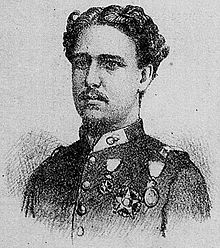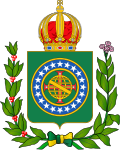Alfredo d'Escragnolle Taunay, Viscount of Taunay
- Machine translation, like DeepL or Google Translate, is a useful starting point for translations, but translators must revise errors as necessary and confirm that the translation is accurate, rather than simply copy-pasting machine-translated text into the English Wikipedia.
- Consider adding a topic to this template: there are already 1,522 articles in the main category, and specifying
|topic=will aid in categorization. - Do not translate text that appears unreliable or low-quality. If possible, verify the text with references provided in the foreign-language article.
- You must provide copyright attribution in the edit summary accompanying your translation by providing an interlanguage link to the source of your translation. A model attribution edit summary is
Content in this edit is translated from the existing Portuguese Wikipedia article at [[:pt:Alfredo d'Escragnolle Taunay]]; see its history for attribution. - You may also add the template
{{Translated|pt|Alfredo d'Escragnolle Taunay}}to the talk page. - For more guidance, see Wikipedia:Translation.
Alfredo d'Escragnolle Taunay | |
|---|---|
 A painting of Taunay | |
| Born | Alfredo Maria Adriano d'Escragnolle Taunay (1843-02-22)February 22, 1843 Rio de Janeiro, Empire of Brazil |
| Died | January 25, 1899(1899-01-25) (aged 55) Rio de Janeiro, Brazil |
| Pen name | Sílvio Dinarte |
| Occupation | Writer, musician, professor, military engineer, historian, politician, sociologist |
| Nationality | Brazilian |
| Alma mater | Colégio Pedro II |
| Literary movement | Romanticism |
| Notable works | Inocência, A Retirada da Laguna |
| Spouse | Cristina Teixeira Leite |
| Children | Afonso d'Escragnolle Taunay |
| Relatives | Félix Taunay, Nicolas-Antoine Taunay, Adrien Taunay the Younger |
Alfredo Maria Adriano d'Escragnolle Taunay, Viscount of Taunay (February 22, 1843 – January 25, 1899), was a Brazilian writer, musician, professor, military engineer, historian, politician, sociologist and nobleman. He is famous for the regionalist novel Inocência [pt], considered a major forerunner of naturalism in Brazil, and for A Retirada da Laguna (1874; originally written in 1872 in French as Le retraite de Laguna), an account of an episode in the Paraguayan War. The Brazilianist Leslie Bethell has described it as "the one undoubted literary masterpiece produced by the Paraguayan War".[1]
He founded and occupied the 13th chair of the Brazilian Academy of Letters from 1897 until his death in 1899.
Life


Taunay was born in Rio de Janeiro, in 1843. His father was Félix Taunay, Baron of Taunay, a painter, professor and headmaster of the Escola Nacional de Belas Artes; his mother, Gabriela Hermínia Robert d'Escragnolle Taunay, was one of the sisters of Gastão d'Escragnolle, the Baron d'Escragnolle; and his grandfather was the French painter Nicolas-Antoine Taunay, Baron of Taunay. Growing up in a cultured environment, Taunay studied Literature and Humanities at the Colégio Pedro II, graduating in 1858. He studied physics and mathematics in what is now the Academia Militar das Agulhas Negras. An Ensign in 1862, bachelor in Mathematics in 1863 and an Artillery Lieutenant in 1864, he was matriculated in the second year of military engineering course, but he did not finish it because of the Paraguayan War. From his experiences at the war, he wrote the memoir Cenas de Viagem in 1868 and the historic account La Retraite de Laguna (French for The Retreat of Laguna) in 1872, translating it to Portuguese two years later.
Taunay wrote and published his first romance, Mocidade de Trajano (Trajan's Youth), in 1871, under the pen name Sílvio Dinarte. Appointed by the future Viscount of Rio Branco José Maria da Silva Paranhos Sr., he became the general deputy of Goiás from 1872 to 1875, a Major in 1875 and the governor of Santa Catarina from 1876 to 1877. In 1885, he asked for his demission of the Major post.
Taunay married Cristina Teixeira Leite, daughter of Francisco José Teixeira Leite [pt] (Baron of Vassouras), granddaughter of Francisco José Teixeira [pt] (1st Baron of Itambé) and grandniece of Custódio Ferreira Leite [pt] (Baron of Aiuruoca). They had one son, the historian Afonso d'Escragnolle Taunay (1876–1958).

Taunay was a member of the Conservative Party, but when the party fell, in 1878, he travelled to Europe, returning only in 1880.
From 1881 to 1884, he was the deputy of Santa Catarina. He candidated himself to the post of deputy of Rio de Janeiro, but was defeated in the elections. From 1885 to 1886, he was the governor of Paraná. One of Taunay's most famous deeds as governor of Paraná was the inauguration of the Passeio Público in the capital Curitiba, in 1886.
In 1889, Emperor Pedro II gave him the title of Viscount of Taunay. However, when Brazil became a Republic, all the nobility ranks were abolished. Taunay, disgusted, abandoned his political career, since he was a monarchist.
He died in 1899 due to diabetes.
Works
Novels
- Mocidade de Trajano (1871 – under pen name Sílvio Dinarte)
- La Retraite de Laguna (published in 1872, originally in French; translated into Portuguese by Taunay in 1874)
- Inocência (1872)
- Lágrimas do Coração (1873)
- Ouro Sobre Azul (1875)
- O Encilhamento (1894)
- No Declínio (1899)
Short story collections
- Histórias Brasileiras (1874)
- Narrativas Militares (1878)
- Ao Entardecer (1901)
Theater
- Da Mão à Boca se Perde a Sopa (1874)
- Por um Triz, Coronel! (1880)
- Amélia Smith (1886)
Other
- Cenas de Viagem (1874)
- A Retirada da Laguna (1874) (published in French as La retraite de Laguna, 1871)
- Estudos Críticos (1881–1883)
- Céus e Terras do Brasil (1882)
Posthumous works
- Reminiscências (1908)
- Trechos de Minha Vida (1911)
- Viagens de Outrora (1921)
- Visões do Sertão (1923)
- Dias de Guerra e do Sertão (1923)
- Homens e Coisas do Império (1924)
References
- ^ Bethell, Leslie, The Paraguayan War (1864-1870, Institute of Latin American Studies, 1996, p.6. [1]
External links

Alfredo d'Escragnolle Taunay (original works in Portuguese)
- Works by Alfredo d'Escragnolle Taunay, Viscount of Taunay at Project Gutenberg
- Free scores by Alfredo d'Escragnolle Taunay, Viscount of Taunay at the International Music Score Library Project (IMSLP)
- Works by or about Alfredo d'Escragnolle Taunay, Viscount of Taunay at Internet Archive
- Works by Alfredo d'Escragnolle Taunay, Viscount of Taunay at LibriVox (public domain audiobooks)

- A biography of Taunay Archived December 8, 2007, at the Wayback Machine (in Portuguese)
- Taunay's biography at the official site of the Brazilian Academy of Letters (in Portuguese)
| Preceded by New creation |  Viscount of Taunay 1889 | Succeeded by None (title abolished) |
| Preceded by Francisco Otaviano (patron) |  Brazilian Academy of Letters – Occupant of the 13th chair 1897–1899 | Succeeded by Francisco de Castro |
- v
- t
- e
- History (Independence of Brazil, First Reign, Regency, Second Reign)
- Economy
- Nobility
- Provinces
- Units of measurement

| Political instances |
|
|---|---|
| Others |
| Armed Forces | |
|---|---|
| Wars |
|
| Abolitionists | |
|---|---|
| Others |














